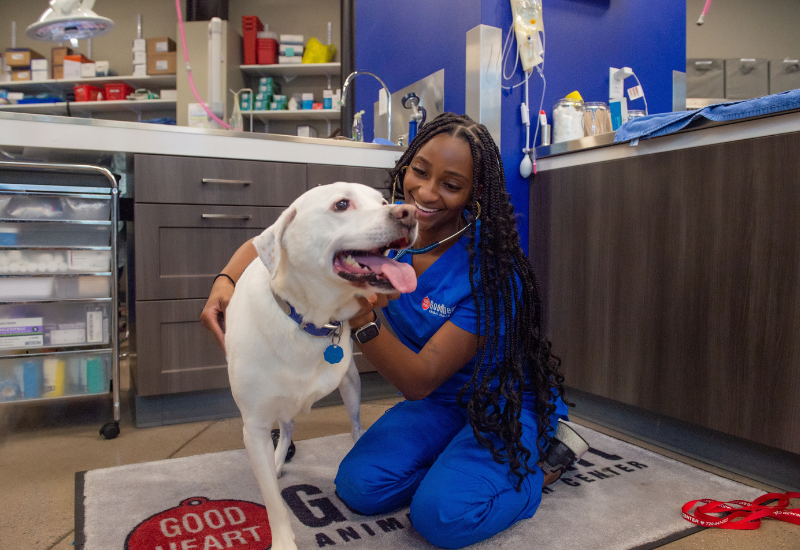Traveling with Your Pets: Tips for a Stress-Free Trip
Wiki Article
Recognizing Your Pet Dogs' Nutritional Demands for Ideal Well-being

Value of Balanced Diets
Guaranteeing a well balanced diet for family pets is important for their total health and wellness and wellness. Pet dogs, like people, need a blend of healthy proteins, carbs, minerals, vitamins, and fats to preserve optimum health.Incorporating a selection of nutrients ensures that pets maintain a durable immune system, healthy and balanced skin, and a glossy coat. Furthermore, a well balanced diet regimen can protect against a host of wellness issues such as weight problems, which is linked to diabetes mellitus and joint troubles, or malnutrition, which can result in developmental delays and organ dysfunction.
Animal owners need to be conscious of section dimensions and caloric intake, as overfeeding or underfeeding can have major consequences. Consulting with veterinarians or pet nutritionists can help customize diet plans to meet particular needs, making certain that family pets obtain the proper balance of nutrients needed for their size, task, and age level. A well balanced and consistent diet regimen is vital for an animal's longevity and joy.
Species-Specific Nutritional Demands
How do various types of pets have differing nutritional needs? This concern highlights the necessity for a customized approach to feeding our animal companions. Each types possesses special metabolic paths, digestive system systems, and nutritional demands that need to be fulfilled for ideal health. For circumstances, pets are omnivores, requiring a well balanced diet plan of fats, proteins, and carbs, while pet cats, as obligate carnivores, require a higher healthy protein consumption derived mostly from animal resources.Birds, relying on their varieties, may require a diet plan rich in seeds, fruits, or bugs, highlighting the diversity within the avian world. Pets. Reptiles, such as snakes and turtles, in a similar way need species-specific diet regimens, with some needing high levels of calcium and others, a well-calibrated balance of bugs and plant matter
Recognizing the dietary differences amongst different varieties is critical for family pet owners. By catering and acknowledging to these differences, we guarantee the stipulation of proper nourishment, sustaining the overall wellness and vitality of our pet dogs.
Age and Size Considerations
While species-specific dietary requirements lay the structure for an animal's size, diet regimen and age more improve these needs. Young pets, such as kittycats and pups, require diet regimens rich in calories, healthy proteins, and important nutrients to sustain quick growth and growth. These young animals have greater metabolic prices and need even more frequent feedings to sustain their energy degrees and guarantee correct growth of bones, body organs, and muscular tissues.As pet dogs age, their dietary needs transform considerably. Adult pets usually call for fewer calories than their younger counterparts yet still need a well balanced diet to keep total health and wellness and vitality. Solutions designed for adult pet dogs often concentrate on preserving weight, advertising digestion health and wellness, and sustaining an energetic lifestyle. On the other hand, senior pet dogs may take advantage of specialized diet plans that resolve age-related difficulties, such as joint wellness, cognitive function, and body organ assistance.

Wellness Issues and Dietary Adjustments
Certain wellness conditions can substantially affect the dietary needs of family pets, demanding customized nutritional modifications to support their health. For example, pet dogs with diabetic issues may take advantage of diet plans that are high in fiber and reduced in easy carbs to help regulate blood sugar level levels. Similarly, obese pets usually require reduced-calorie diet regimens to advertise weight reduction and protect against affiliated health complications.Pets with kidney condition may require diet plans reduced in phosphorus and protein to relieve kidney workload. Omega-3 fats, known click to find out more for their anti-inflammatory properties, can be useful for pet dogs struggling with problems like joint inflammation or inflammatory bowel disease. Additionally, pet dogs with food allergic reactions or intolerances may need hypoallergenic diet regimens, typically needing a procedure of removal to determine and leave out upseting components.
Vet advice is critical when making dietary changes, as incorrect nourishment can aggravate existing wellness issues or cause new ones. Routine surveillance and modifications based upon the pet's feedback to nutritional adjustments are crucial. A well balanced method, taking into consideration both nutritional and clinical needs, makes sure that nutritional treatments contribute favorably to managing health problems, improving not only the pet's health yet also their lifestyle.
Tips for Picking Quality Pet Dog Food
Picking the appropriate family pet food is crucial for guaranteeing your family pet's wellness and long life. A well balanced diet regimen sustains their immune system, keeps healthy and balanced weight and promotes total vigor. Begin by consulting your veterinarian to recognize your pet dog's certain dietary demands based on age, health and wellness, and type condition.When assessing family pet food, look at the ingredient list. High-quality family pet foods often note genuine meat, fowl, or fish as the primary component. Avoid products with excessive fillers like corn, soy, or spin-offs that supply restricted nutritional worth. Try to find well-known ingredients and natural preservatives as opposed to man-made ones.
This suggests the food meets well-known dietary standards. Brands with a history of recalls or poor top quality control ought to be approached with care.
Think about whether your pet dog would certainly profit from special formulations such as grain-free, high-protein, or limited-ingredient diet plans. These can be helpful for pet dogs with allergies or certain health issues.
Conclusion
A thorough understanding of pet dogs' nutritional requirements is vital for promoting their optimum well-being. By adhering to these concepts, family pet proprietors can substantially add to their family pets' growth, power degrees, and general health and wellness, fostering a better and much healthier life.
Selecting the ideal family pet food is crucial for ensuring your pet's health and wellness and longevity. By sticking to these principles, pet dog proprietors can considerably add to their animals' development, power levels, and overall health, promoting a better and healthier life.
Report this wiki page